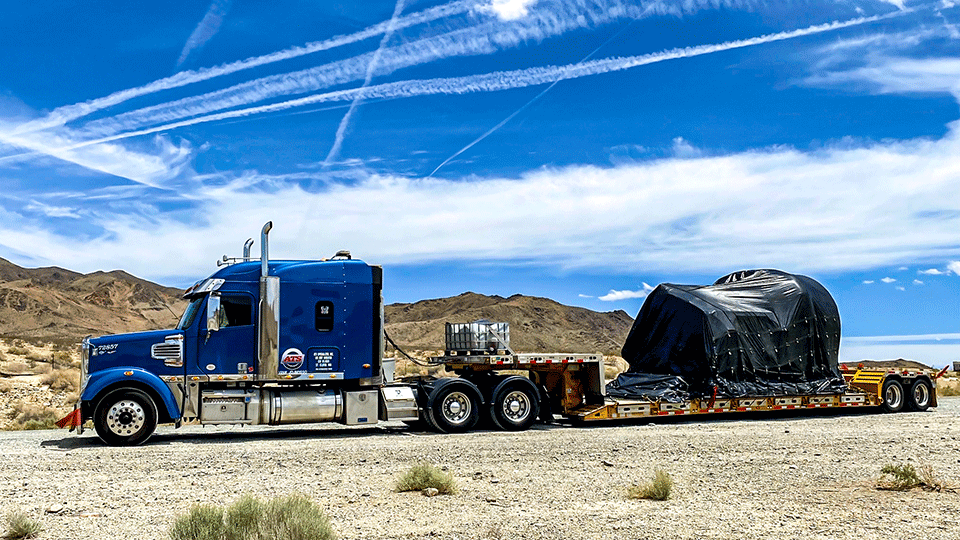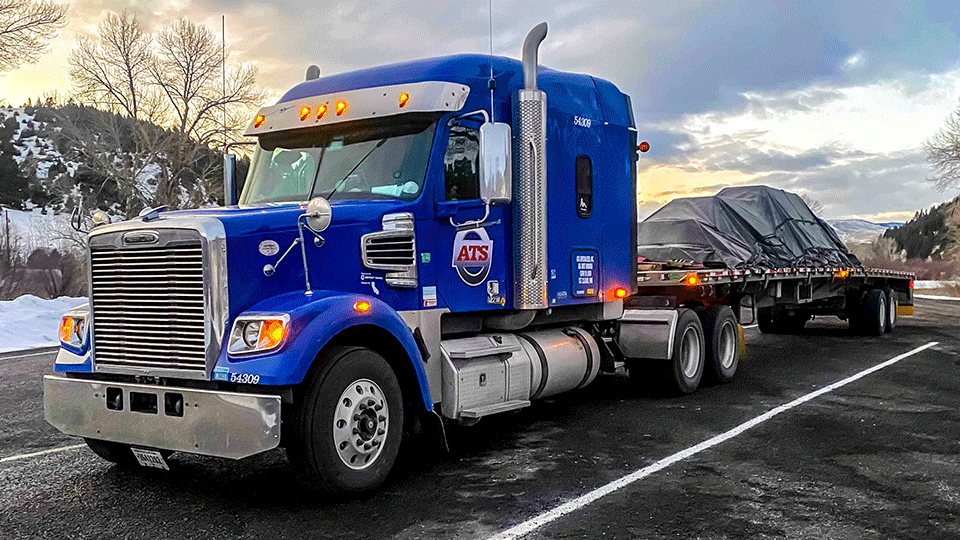
When it comes to choosing your transportation provider, there’s certainly no shortage of options. Sure, depending on your location(s), commodity type(s), company goals and the time of year, your pool of viable providers may fluctuate — however slightly.
As your company’s logistics expert, it’s your job to make these discernments. You’re good at what you do, providing steady-handed guidance to company stakeholders and partners.
That said, deciding which carriers truly fit your business’ needs isn’t simple.
Developing, managing and maintaining a pool of reliable transportation providers takes a thorough understanding of your options — and the strengths, weaknesses and realities of each.
Large trucking companies offer their customers stability, expertise and a reliable source of capacity, making them a popular option among shippers across industries.
In certain scenarios, using a large carrier can make a lot of sense, providing the capacity you need at a competitive price point. However, there are also downsides to working with large trucking companies. It’s important to have all the facts before entering any partnership — especially with something as important as your supply chain fulfillment on the line.
Anderson Trucking Service (ATS) has been operating as an asset-based trucking company since 1955. Today, after nearly seven decades of offering transportation services, we continue to deliver on the commitments we make to customers. Over the years, we’ve also seen the first-hand impression great transportation partnerships can leave on the supply chains of companies large and small.
In many circles, ATS is considered a large trucking company. As such, we understand the drawbacks and upsides associated with shipping freight using a company of our size (or larger).
To help you weigh the pros and cons of deciding on a large freight carrier, this article will do three things:
- Define the term “large” trucking company
- List the pros of shipping freight with a large trucking company
- List the cons of shipping freight with a large trucking company
What is Considered a Large Trucking Company?
It’s challenging to pinpoint the exact size at which a carrier is considered “large.” This definition is far from definitive. In fact, when measured against a single-truck outfit, a 50-truck carrier could be classified as large. Similarly, 1,000 trucks and 2,000 trailers is a far smaller fleet than one with 3,000 and 6,000.
As a result, it’s hard to set parameters here. That said, for the purpose of this article, let’s set the threshold at 100 trucks. A fleet of this size is enough to surpass $27.5 million in annual revenue — the amount needed to exceed qualification as a “small business” as defined by the Small Business Administration (SBA).
This isn’t to say the pros and cons below don’t apply to 99-truck trucking companies. Instead, “around” 100 trucks should be used as a frame of reference throughout this article.
The Pros of Shipping Freight With a Large Trucking Company
The main advantages of working with a large trucking company are tied to the financial and capital resources it has. Because large carriers have so many more assets and income streams than smaller operations, they can afford customers several upsides their counterparts simply can’t.
Prime among these advantages are:
- Expansive coverage
- Heightened truck driver training and reliability
- Convenience
- Cost-efficiency for higher-volume requirements
1) Expansive Coverage
Depending on how they’re structured, a large carrier may have terminals, warehouses, facilities and trailer yards in multiple locations across the U.S.
Large trucking companies will also have a wide network of truck drivers domiciled across a region or group of regions. For this reason, large carriers can be relied on to cover shipments along an array of lanes and into/out of an expanse of origins/destinations.
This coverage can come in useful on short notice, for projects and when surge capacity is needed.
2) Heightened Truck Driver Training and Reliability
Truck drivers are the most important piece of the freight shipping process. Drivers are responsible for maneuvering, securing and safely transporting freight from A to B. While there are hundreds of thousands of truck drivers in the U.S., not all of them are of the same quality.
Developing experience and proficiencies as a truck driver takes time and continuous exposure to training and new challenges. Large trucking companies offer drivers these things.

Be it through formal training or the opportunity to continually transport all kinds of freight, large trucking companies develop quality and efficient truck drivers. This is to the benefit of shippers as it ensures a safe and secure transit for their cargo, limiting the likelihood of mishaps due to an undertrained/exposed truck driver.
In the end, you may get higher on-time pick-up and delivery rates with large carriers than with smaller ones. You can also rest assured that your cargo will be handled and secured properly under the watch of a large carrier’s driver.
Related Article: Why Truck Driver Experience and Quality Should Matter to Your Supply Chain
3) Convenience
Usually, large trucking companies have a diversity of service offerings. For this reason, it’s not unreasonable to expect a large carrier to meet a variety of your transportation needs. It’s possible to secure dry van, reefer, open-deck and cross-border capacity from a single company.
This is convenient, especially once you’re accustomed to the carrier’s processes and they’re familiar with yours. With this relationship in place, and a point of contact you trust, booking a variety of loads with one carrier creates efficiencies and simplifies your job.
Instead of having to work with several smaller carriers to cover the same requirements, a large carrier may have all of these services housed conveniently under its roof.
4) Cost Efficiency For Higher-Volume Requirements
Large trucking companies often have economies of scale in high-volume scenarios. This allows them to dedicate a portion of their fleet to a shipper at a relaxed price per truck. Consistently keeping trucks loaded and moving is highly valued by trucking companies — which have several fixed costs to contend with.
For this reason, companies with larger fleets value shippers that utilize a group of their assets for a predetermined period of time. In turn, winning these bids may drive large carriers to submit a relaxed price per truck — a luxury their size affords them.
This isn’t possible for smaller trucking companies that don’t have as much capital or financial stability.

The Cons of Shipping Freight With a Large Trucking Company
There are, of course, downsides to saddling your supply chain with a large trucking company. Compared to smaller carriers, you’ll find a variety of deficiencies with big providers.
Namely, the most prominent cons of shipping freight using a large trucking company are:
- Service inflexibility
- Lack of personal attention
- Price on certain loads
1) Service Inflexibility
As a trucking company’s size increases, its ability to veer from its norm — especially for a one-off load — fades. The systems and infrastructure these companies have in place dictate the services they can effectively provide.
As a result, don’t expect large carriers to have the same flexibility to customize a solution for your freight.
2) Lack of Personal Attention
Because large trucking companies handle a huge volume of shipments, it can be challenging to get personalized attention or timely customer service. While it’s never the goal to leave a customer hanging, larger carriers are concerned — primarily — with making more money, increasing their market share and growing.
For smaller shippers, this lack of personal attention could be felt more. With so many larger customers on their plate, sometimes the biggest trucking companies may be slow to address the concerns of less-frequent shippers, prioritizing their premiere clients above the field.
3) Price on Certain Shipments
One-off shipments aren’t particularly attractive to large trucking companies. Though this isn’t always the case, since these companies have steeper overhead expenses and more drivers/employees to compensate, they tend to perform best when a shipper gives them a consistent volume commitment.

For this reason, sometimes large trucking companies can’t price one-off shipments to/from remote areas or to locations outside of their area(s) of strength as competitively as smaller carriers or freight brokers. This could be inconvenient for you if you regularly require these capacities. In this case, you may want to consider working with a smaller, regional carrier.
Related Article: The Top 10 Most Expensive Freight Shipping Destination Types
Building Your Network? Consider a Small Carrier Too!
Large trucking companies are a great fit for many shippers. These carriers can provide regular capacity across a variety of service types, making them a central piece of many supply chains.
If you’re looking to work with a carrier that can provide expansive coverage, qualified and experienced truck drivers and cost efficiency in many scenarios, consider a big one. On the other hand, there are several downsides to working exclusively with large trucking companies.
That’s why, as you build out your transportation network it’s good to have a mix of providers — large and small.
Your next step is to read this article on the pros and cons of working with a small trucking company — some of them may surprise you. And, if you need some help deciding how many transportation providers you should have, take a peek at this article.
Finally, if you have any questions about your supply chain or want to learn more about working with ATS, don’t hesitate to contact us here. We’re more than happy to help you in any way you need.




